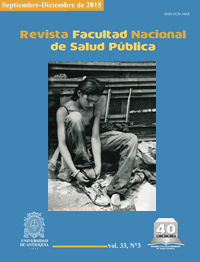Intervención educativa con docentes: fortalecimiento de habilidades psicosociales para la vida y hábitos saludables con escolares en Bogotá
DOI:
https://doi.org/10.17533/udea.rfnsp.v33n3a10Palabras clave:
promoción de la salud, hábitos, educación para la salud comunitaria, salud escolarResumen
Objetivo: Determinar los resultados de la intervención educativa dirigida a docentes para el fortalecimiento de hábitos saludables y habilidades psicosociales para la vida en niños y niñas de básica primaria en instituciones públicas de la ciudad de Bogotá. Metodología: Se realizó un estudio cualitativo con enfoque descriptivo para lo cual se utilizó como técnica de recolección de información el grupo focal, buscando ahondar con las personas participantes su experiencia, metodología, implementación y resultados del proceso formativo con enfoque de promoción de la salud con énfasis en Habilidades psicosociales para la Vida y Hábitos Saludables con los grupos de escolares. Para el análisis de la información se tuvo en cuenta el enfoque propuesto por Taylor y Bogdan, y para apoyar el análisis se utilizó el software ATLAS ti (v. 6.2). Resultados: La participación de docentes en los procesos formativos tuvo una repercusión en diferentes escenarios de sus vidas, es así como se identifican vivencias en su vida personal, familiar y laboral. Lo cual se explica desde tres ámbitos: lo novedoso del proceso formativo, la creatividad generada en su práctica docente y la solidaridad a la hora de la implementación en las instituciones educativas. Conclusiones: Las personas participantes de la investigación identifican la metodología participativa utilizada en el proceso formativo como innovador y elemento importante para su adherencia al programa, superando así sus predisposiciones iniciales a participar. De la misma manera, el fortalecimiento de la creatividad de docentes es un factor que contribuye al ejercicio docente.
Descargas
Citas
(1). Mantilla B, Hakspiel C, Hernández D, Velasco C, Aragón D, Pine-da L, Estupiñan M. Guía Educación entrepares: Una herramienta para conversar sobre sexualidad entre jóvenes. Instituto PROI-NAPSA – UIS; Segunda Edición. 2013
(2). Birrell R, Orley J, Evans V, Lee J, Sprunger B, Pellaux D. Life Skills Education for Children and Adolescents in Schools. Géne-va Switzerland: World Health Organization; 1997. Disponible en: http://whqlibdoc.who.int/hq/1994/who_mnh_psf_93.7a_rev.2.pdf
(3). Ministerio de Educación. Tutoría y orientación educativa en la educación secundaria. Lima: Ministerio de Educación; 2005.
(4). Ulin P, Robinson E, Tolley E. Investigación aplicada en salud pública. Métodos cualitativos. Organización Panamericana de la Salud; 2006: p. 33-43. DOI: https://doi.org/10.1590/S0864-34662007000400018
(5). Taylor S.J, Bogdan R. Introducción a los métodos cualitativos de investigación. La búsqueda de significados. Ediciones Paidos Iberica. 1987. P. 152-160.
(6). Mantilla L, Chahín I. Habilidades para la Vida – Manual para aprenderlas y enseñarlas. EDEX. Julio 2007. Disponible en: http://publicaciones.edex.es/todas/133-habilidades-para-la-vida-manual-para-aprenderlas-y-ensenarlas.html
(7). Flores R, Herrera G, Melero J. Guía para el profesorado. EDEX. 1989 – 2009.
(8). Herrera G. Cuentos para Conversar. EDEX. 2007 – 2011. Dispo-nible en: http://tv.edex.es/categories/cuentos-para-conversar/
(9). Herrera G, Chahín I. La Fiesta de la Conversación: Un ambiente y una metodología para la comunicación educativa. EDEX. 2007. Disponible en: http://publicaciones.edex.es/todas/136-la-fiesta-de-la-conversacion.html
(10). Mantilla B, Hakspiel C, Chahín I, Rincón A, Larrota M, Herrera G, Casas L, Castellanos L. Guía de Par en Par: Escuelas Promotoras de la Salud y el Desarrollo. Instituto PROINAPSA – UIS. 2009.
(11). Saenz, M. “La Aventura de la Vida”: un programa de prevención de drogas en América Latina. Rev. costarric. salud pública [online]. 2001, vol.10, n.18-19 [cited 2015-02-03], pp. 40-51. Disponible en. http://www.scielo.sa.cr/scielo.php?script=sci_arttext&pid=S1409-14292001000100006&lng=en&nrm=iso.
(12). Gaviria AE, Castrillón A. Trujillo L. Uribe J, Peñaranda F. Evalua-ción del programa “La aventura de la vida” desde la perspectiva de sus actores en una escuela de educación básica primaria, Me-dellín, 2002-2004: estudio de caso. Rev. Fac. Nac. Salud Pública. 2007; 25 (2): 59-64
(13). Basen-Engquist y cols., citado en: Organización Panamericana de la Salud. Enfoque de habilidades para la vida para un desarrollo saludable de niños y adolescentes. División de Promoción y Pro-tección de la Salud. Programa de Salud Familiar y Población. Uni-dad Técnica de Adolescencia. Septiembre 2001. Disponible en: http://www1.paho.org/Spanish/HPP/HPF/ADOL/Habilidades.pdf
(14). Diazgranados S, González C, Jaramillo R. Aproximación a las problemáticas psicosociales y a los saberes y habilidades de los docentes del distrito. (Spanish). Revista De Estudios Sociales [se-rial on the Internet]. (2006, Apr), [cited October 28, 2013]; (23): 45-55. Available from: Academic Search Complete. DOI: https://doi.org/10.7440/res23.2006.04
(15). Evaluación de la aplicación en diez países de Iberoamérica del programa de educación sobre drogas “La Aventura de la Vida” Bilbao, Octubre 2002
(16). Choque-Larrauri R, Chirinos-Cáceres J. Eficacia del Programa de Habilidades para la Vida en Adolescentes Escolares de Huancave-lica, Perú. Rev. salud pública [serial on the Internet]. 2009 Apr [cited 2015 Feb 03] ; 11( 2 ): 169-181. Available from: http://www.scielosp.org/scielo.php?script=sci_arttext&pid=S0124-00642009000200002&lng=en. http://dx.doi.org/10.1590/S0124-00642009000200002 DOI: https://doi.org/10.1590/S0124-00642009000200002
Descargas
Publicado
Cómo citar
Número
Sección
Licencia

Esta obra está bajo una licencia internacional Creative Commons Atribución-NoComercial-CompartirIgual 4.0.
El autor o los autores conserva(n) los derechos morales y cede(n) los derechos patrimoniales que corresponderán a la Universidad de Antioquia, para publicarlo, distribuir copias electrónicas, incluirlas en servicios de indización, directorios o bases de datos nacionales e internacionales en Acceso Abierto, bajo la licencia Creative Commons Atribución-No Comercial-Compartir Igual 4.0 Internacional Comercial (CC BY-NC-SA) la cual permite a otros distribuir, remezclar, retocar y crear a partir de la obra de modo no comercial, siempre y cuando se dé crédito respectivo y licencien las nuevas creaciones bajo las mismas condiciones.












 --
-- --
-- --
--